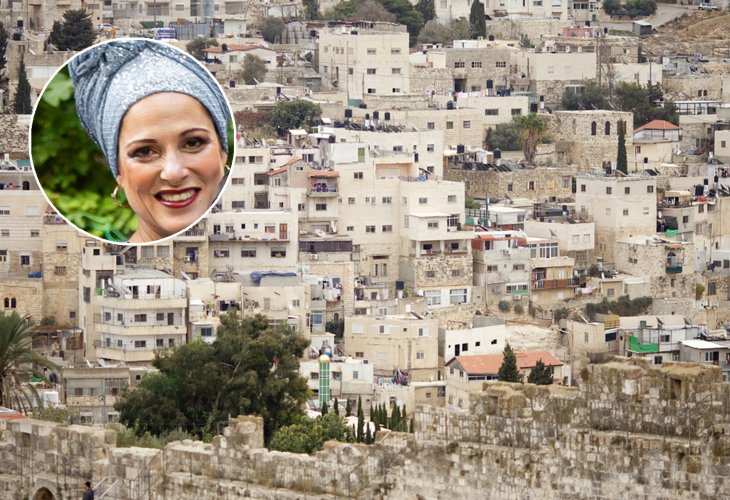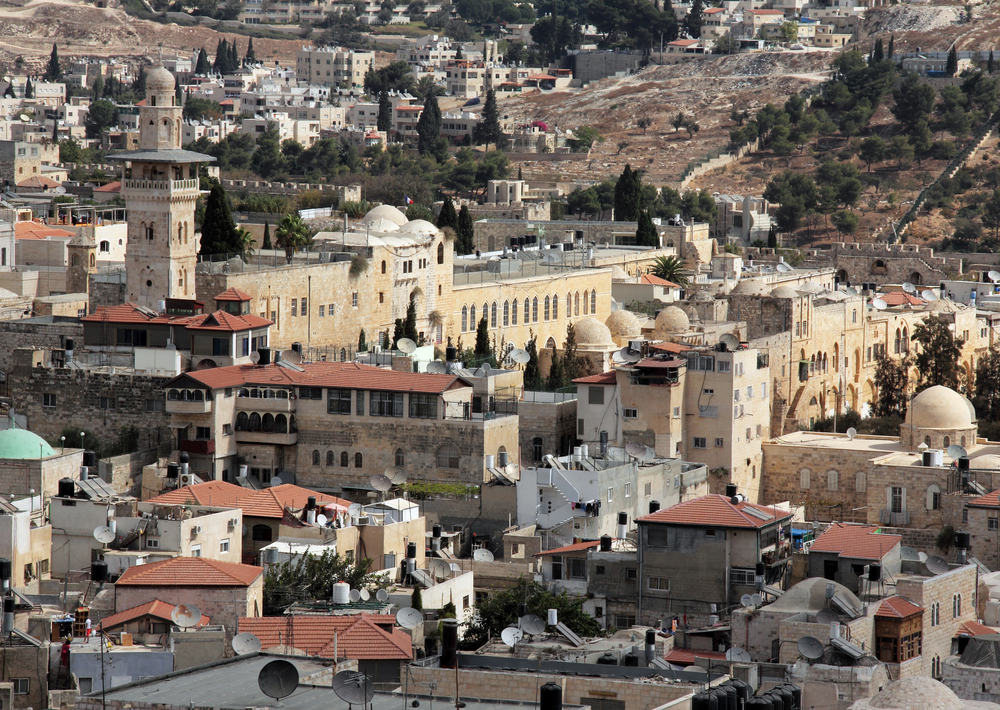Miracles in the Muslim Quarter: A Family's Bold Move
Gedaliah and Efrat Petrazil, parents of 11, sold their home to buy a house in the Muslim Quarter, despite never seeing it and uncertainties about their success. "The lawyer told us, 'You're not sane.'"
 Inset: Efrat Petrazil (photo: shutterstock)
Inset: Efrat Petrazil (photo: shutterstock)When Gedaliah and Efrat Petrazil asked a lawyer about the risk involved in the deal they were entering, he said, "The risk is sane, but you are not." Even Mati Dan, head of the Ateret Cohanim organization who was leading the process, pleaded with them, "Do not sell your house before it’s safe, you are a family with many children." Yet, despite the uncertainties, they decided to proceed to purchase a house in the Muslim Quarter they had never seen, without knowing if it would succeed. "At some point, Mati called and said the deal fell through," Efrat describes, "and then the miracles began."
A Painful Process
The Petrazil family had lived for over 20 years in the old Katamon neighborhood in Jerusalem. "We had a beautiful, well-maintained house in a good neighborhood, where we raised our 11 children," she begins. "Our connection to Jerusalem and the Temple was like any Jew's—in our hearts, prayers, mitzvah observance, and knowing that our eyes are ever toward this place. The idea of living practically close to the Temple never crossed our minds."
At that time, one of their sons was studying at the Torat Chaim yeshiva and began participating in the monthly 'Gate Tour.' "During the tour, we pass between the gates of the wall and the ones leading to the Temple Mount, offering prayers and yearning for Jerusalem in song. Eventually, we decided to join him. Despite the difficulty, each time we felt our souls more connected to the place, a unique connection beyond words. Only those who experience it understand its depth. It feels like a magnet—the more we visit, the more we yearn."
About two years ago, on Jerusalem Day, the Petrazil family again joined the Gate Tour. "This time was very powerful and emotional," Efrat describes, "There's a point where you see the Temple area and tear your clothes. Only if you've seen it within the last thirty days, you’re exempt. Rabbi Neventzal, the rabbi of the Jewish Quarter, believes that those who live in Jerusalem and truly mourn the destruction surely visit more than once every thirty days. Those who don’t, surely the matter doesn’t truly affect them, making tearing only a superficial act. Realizing this—that those who mourn visit every thirty days—shook my husband that day, so he decided to join the Gate Tour every month to see the Temple area."
Each visit had its impact. "We began feeling tied to Jerusalem with bonds of love. Also, we had sons studying in the Zilberman Talmud Torah, located in the Jewish Quarter. Another son, now in a high yeshiva, also constantly spoke about Jerusalem's sanctity, our connection to it, and that we should act for its redemption."
A 40-Year Buying Process
A year and a half ago, the Petrazils decided to take a step forward and contact Mati Dan. "He handles all matters of redeeming houses in the Muslim Quarter and East Jerusalem," Efrat explains. "We told him we were considering it and wanted to redeem a house. Rarely does a private Jew do such a thing. Most house redemptions are by organizations, as buying a home in this area entails enormous costs, including legal and other expenses. These raise the property's price far above its real value."
 (photo: shutterstock)
(photo: shutterstock)The house they wanted to redeem had a process spanning 40 years. "The owner initially said he would sell but then changed his mind and passed away. Then came the Oslo Accords, with the Palestinian Authority declaring no one could sell houses in the Muslim Quarter—to Jews or Arabs—fearing someone might dare sell to Jews. Years passed, with ups and downs, and the house still awaited redemption."
Why would an Arab family even want to sell a house to Jews?
"You must understand, many houses in the Muslim Quarter are in very neglected conditions, yet when sold to Jews, they fetch handsome prices, much more than their value. Additionally, Ataret Cohanim ensures every detail in the process, having full commitment in such a transaction."
But even at this stage, the sale process was not easy. "From the start, Mati asked us not to sell our house to avoid ending up with nothing from either side. In such deals, you might pay significantly only to find scammers. We, however, were determined and understood selling our home was necessary to gather the required amount. We knew if the deal fell through, we could find another to buy locally. Concerning fraud fears, we sought advice from an experienced lawyer, who, based on past experiences, assured us the risk was reasonable."
Where did you find the strength to make such a heavy decision?
"Rabbi Neventzal, our rabbi, accompanied us throughout, supporting and blessing us. By the way, when Rabbi Shlomo Zalman Auerbach was elderly, people asked him who could bless others in his stead, and he replied, 'Go to Rabbi Neventzal; he’s worthy of giving blessings.' Rabbi Neventzal was instrumental, alongside Rabbi Simcha Kook, urging Mati Dan to take on house redemption duties. Before Mati’s wedding, Rabbi Kook asked him to invite his Arab neighbors in the Muslim Quarter. The remarkable thing is the families whose invitations Mati handed out all eventually had their houses redeemed. 'I wish I had given out more envelopes,' Mati once told us, illustrating Israel's greatness."
"Unbelievable Progress, Come Over Now"
During the journey to buy the building, the Petrazils experienced ups and downs. "When Mati called to say they reached an impasse and the deal fell through, we had already sold our house and realized we needed to rent," Efrat describes. "It was hard, but we still held faith. On the eve of Tisha B'Av, Mati called again and said, 'Unbelievable progress in the process, come over now.' Hours before the fast, while needing to prepare food for my kids, I stood bewildered, wondering what to do. But then it dawned on me that on this day, of all days of mourning for Jerusalem, we had the privilege to be part of its rebuilding. When we arrived, Mati asked, 'What are you doing up there in the heavens that suddenly things are changing supernaturally?' I replied, 'Hashem wants to see our efforts; then He does His.' We went with pure faith with the desire to redeem a house and make one more step toward redemption. We knew the journey could have shifts, but still chose it, and Hashem—seems He couldn’t stay idle."
A few weeks later, the couple signed the purchase contract. "It was a sparse contract for a house we had never seen nor entered. Even the size of the structure was only estimated between 95 to 140 square meters, with the smaller size being accurate. But when we knew it was ours, we cried with joy and excitement for the privilege to return it to Jewish hands. At the key-giving ceremony, we blessed 'the good and the beneficent' and felt the footsteps of the Messiah."
It turns out the building has a respectful history. "Rabbi Eliahu Guttmacher, a student of Rabbi Akiva Eiger, bought the courtyard around 1870. Though he never got to immigrate to Israel, he worked to establish a study house there. After the 1929 riots, with the severe situation and fear in place, the Hirshenzon family, managing the courtyard, received permission to sell it to Arabs. Now, a few weeks before the 2024 riots, the house returned to Jewish hands. It feels like closing a circle."
Does redeeming one house feel like a drop in the ocean? Is it worth all the effort?
"Just one Jew moving into the Muslim Quarter shakes everyone there. Their war is for Al-Aqsa. They want Jerusalem, and when we come and say this place is ours, even if it’s just one house, they feel it strongly. This statement has power that illuminates far and touches deeply both them and us. Eventually, reality on the ground will show whom this place truly belongs to. After we bought, other Jews awakened, declaring they wanted to buy too, creating many ripples. Also, it’s one house, but strategically located on the hilltop, allowing for a guard post to control the slope. After the terrible massacre, we all understand how vital Jewish presence in such places is."
What about high purchase costs? Were you able to handle them?
"We managed to buy the house, but it’s rather run-down, needing renovation before we move in. Meanwhile, a younger family is living there, despite harsh conditions, to guard it against intrusion. Overall, buying the house was fully funded by us, with additional transaction expenses covered by the Ateret Cohanim organization. It’s a vast sum of money, and we’re currently in a fundraising campaign to gather it."
But with her great faith, Efrat remains hopeful. "There was a wealthy Jew from Canada named Reichman, asked to donate money to build a yeshiva. He consulted with Rabbi Chaim Kanievsky, who advised him to donate—but not the entire amount. The Rabbi explained that to build something holy requires as many people's merit as possible. We feel that Hashem wants the Jewish People to partner in this journey, assisting in the rare mitzvah of house redemption and Shechina’s return to Jerusalem. As we’ve seen divine assistance so far, we’re confident that Hashem will make our path successful."
"Mom, Where Is Hashem More?"
Recently, the couple took their kids to visit their future home. "I'm walking there with them, suddenly realizing there's no close parking and many stairs. I know of another family with 14 children living in a smaller house in the Muslim Quarter. On the way home through Rehavia, I told my son, 'Look, people here live normally, with parking and an elevator.' My son replied, 'But Mom, where is Hashem more?' With those words, my arguments were silenced."
The dream that surfaced not long before began taking shape. "People ask us if we dreamed of this for years, and the truth is we started thinking about it just a year and a half ago," Efrat says excitedly. "Still, I’ve long dreamed of living in an old, historic house facing a yeshiva. I prayed so much for it. When we redeemed the house and my husband told me it was once a study house, I shivered. How Hashem brings me to a home we redeem from non-Jewish hands, yet it’s a place of holiness. Right next to it stands the Zilberman Yeshiva, thus fulfilling another dream. Overall, we've seen so many miracles along the way—from our house selling easily even amid high-interest rates to being able to buy this building."
In conclusion, Efrat shares, "Our son-in-law recently shared a beautiful Torah teaching, ‘Because of Shabbat, Jerusalem is redeemed.’ We are very strict about Shabbat—I shop on Monday, cook on Wednesday, and by Thursday the table is set. We welcome Shabbat at the earliest possible time, even at three thirty in the afternoon during winter! During meals, we focus greatly on the spiritual aspect, and we say farewell to Shabbat at Rabbeinu Tam’s time. Over the past year, each Friday night, in that special time of desire, we prayed to redeem a house. Suddenly, I thought—maybe it’s the merit of Shabbat that helped us. I feel we received a tremendous gift from Hashem, one not everyone is fortunate to get."

